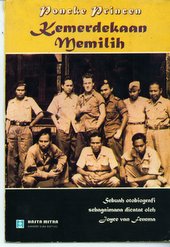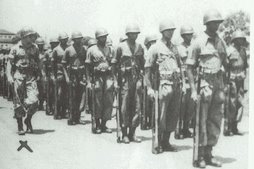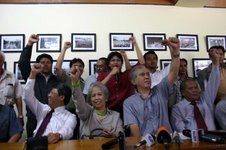Forgotten mud victims vow to realize dream
Evi Mariani and Dwi Atmanta , The Jakarta Post
Of the nearly 12,000 families affected by the mudflow in the East Java town of Sidoarjo, some 600 have chosen a harder course for the sake of justice and solidarity.
Their homes, rice fields and other belongings disappeared when the mud from a drilling operation of PT Lapindo Brantas buried their Renokenongo village and neighboring villages on May 29, 2006.
The families have since lived in a place designated for Porong market. They stay in small kiosks of the market, living with few amenities as they continue to reject the government's compensation scheme.
Community leader Pitanto says a dream of starting a new life on a 12-hectare plot of land near Porong, valued at Rp 250 billion (US$27 million), binds the big family.
"The government's scheme provides compensation money only to those who own land and houses. There are about 200 families who don't own any; some of them are widows and elderly people. How can we leave them?" Pitanto said.
Pitanto himself could have taken the compensation money; his and his wife's assets make the family eligible for the first installment of Rp 60 million in compensation, enough for a down payment on a house away from the shabby market.
Under the government's scheme, each household receives a first payment equal to 20 percent of the total compensation, with the lion's share to be paid two years after the down payment on a new home is made. The plan's formula has been set at Rp 1.5 million per square meter for buildings and Rp 1 million per square meter for land.
Villager Lilik Kamina says the scheme is a form of injustice.
"We want the payment in full, 100 percent at once. The mud came at once, without installments," she said.
Pitanto said if the families received the full compensation money, they could pool their resources to buy their dream land.
The Renokenongo villagers formed the Association of Lapindo Mud Victims, led by Pitanto and Sunarto. The group receives support and advocacy from four volunteers who say they came to help after seeing no nongovernmental organizations, either domestic and international, step in.
The perseverance of the 600 families has met with numerous challenges. The group originally numbered 875, with 275 families having moved on.
Temptations to leave the group often crop up in the form of intimidation and campaigning by people who want families to sign on for the government's scheme.
"The regent came to the market once, saying out loud in front of people that they should follow the government. He said that Haji Sunar and I would be arrested soon, and nobody would take care of the people anymore," Pitanto recalled.
So far, though, there has been no arrest.
Lili says children have been targeted by the campaign to divide the 600 families.
"My child is sometimes bullied by his friends whose parents have taken the compensation money. They tell him, 'Your parents have no money. My parents have a lot'," Lilik said.
Lilik and Pitanto said children and teenagers at the shelters often complained about the life at the market. It is indeed an abnormal life. To get clean water, the families have to shell out Rp 180,000 a day.
Their struggle is facing a more daunting challenge after Lapindo stopped, as of May 1, providing daily meals for mud victims. To make ends meet, the people have turned to begging.
Recently Lilik had a chance to try her luck on the Deal or No Deal TV quiz show aired by private channel RCTI. She made Rp 18 million out of a possible Rp 2 billion, money that went to the association's coffer to buy water and other necessities.
Pitanto says the displaced people are struggling to create a sense of normal life in the shelter.
"We have regular religious activities," Pitanto said.
Lilik added the people held sports activities to stay united.
"We are strong because this is our struggle together. We want to be together," said Lilik, who also runs a kindergarten for children of the mud victims.
One of the four volunteers, Paring Waluyo, says the villagers' resilience comes from their leaders.
"Porong community is a patron-client society. The villagers look up to people who are deemed exemplary and inspiring. Pitanto and Haji Sunar are two of them," said Paring, who has been living with the mud victims for a year.
Paring said the four volunteers assisted the mudflow victims in formulating their demands, organizing rallies and linking the people to pressure groups.
The volunteers say they lend a helping hand due to a concern about the silence of NGOs, which contrasts to the humanitarian attention received by other disaster-hit areas such as Aceh and Nias.
"The disaster here is perhaps incomparable to what happened in Aceh and Nias, but its social, psychological, economic and cultural impacts are as devastating as the tsunami's," said Paring, who graduated from Brawijaya University's School of Social and Political Sciences five years ago.
He said he heard from an international NGO activist of "political barriers" facing the NGOs intending to help the mud victims.
"He told me a certain authority has threatened to disrupt his group's other projects in the country if it entered Sidoarjo," he said.
A few groups had extended help to the displaced people, he said.
"But they offer one-time charity. No one provides us long-term assistance," said Paring, who is preparing a 100-page book on the mudflow disaster.
Inspired by the late human rights advocates Yap Thiam Hien and H.J. Princen, the Institute for Human Rights Defenders recently conferred the Princen award to both the mud victims and their advocates for their persistent fight for their rights.
Other winners of the award were twin sisters Rossy and Ryan, who run schools for Jakarta's poor children. Past winners include rights activist Munir, Institute of Public Administration lecturer Inu Kencana Syafei and SCTV channel.
"The criteria include consistency in advocating human rights and the impact, even if it's local or small," institute executive director Ahmad Hambali said.
The award serves as a reminder of the ongoing tragedy in Sidoarjo, which many people have begun to forget, Ahmad said.
Paring, Lilik and Pitanto received the award in Jakarta, representing the mud victims.
"We only gave them a trophy. We can't afford to provide prize money, just moral support," Ahmad said.
Pitanto said he and other displaced people did not consider cash prize an issue.
"The more important thing is that there are people who appreciate our struggle."
http://www.thejakartapost.com/news/2008/05/29/forgotten-mud-victims-vow-realize-dream.html
skip to main |
skip to sidebar

Sampul Buku Otobiografi Princen "Kemerdekaan Memilih" (Een kwestie van kiezen) karya Joyce van Fenema

buku otobiografi Poncke edisi belanda "Een kwestie van kiezen"

Disertir KNIL Poncke Memimpin Pasukan TNI di Depan Gedung Sate Bandung 1950 (x)

bersama dengan CSO dalam Deklarasi Gerakan Masyarakat Adili Soeharto
LEMBAGA PEMBELA HAK-HAK AZASI MANUSIA
Indonesian Institute for the Defense of Human Rights
office
Jl. Kramat V No. 2, Jakarta 10430, Phone +62 21 3106085, Fax. +62 21 3923335, email: hjcprincen@yahoo.com, INDONESIA
Apakah anda setuju TNI mengambil alih pemberantasan aksi teroris?
OTOBIOGRAFI

Sampul Buku Otobiografi Princen "Kemerdekaan Memilih" (Een kwestie van kiezen) karya Joyce van Fenema

buku otobiografi Poncke edisi belanda "Een kwestie van kiezen"
OLD FASHION

Disertir KNIL Poncke Memimpin Pasukan TNI di Depan Gedung Sate Bandung 1950 (x)
ACTIVITIES

bersama dengan CSO dalam Deklarasi Gerakan Masyarakat Adili Soeharto
ARCHIVES
Dapur Aktivis
bikin acara mendadak atau lupa bikin spanduk padahal waktu sudah dekat. BUAT SPANDUK PLASTIK DALAM WAKTU 1 HARI, HUBUNGI SAJA TONI 081213885428
DAPUR HARUM CATERING menerima pesanan aneka menu hidangan dan snack untuk resepsi, pesta, seminar. Silahkan hubungi kami WILANDA PRINCEN di 0818 160705 atau 021 92912411
Copyrights
© ahmadhambali. Inc 2008 Protected by copyright, all content dedicated to though enlightment. Unauthorized or unlawful copying or downloading for benefit and commercial purpose expressly prohibited.
![[ LPHAM ]](http://3.bp.blogspot.com/_vrQDJ519U2o/SVHE9rnVYQI/AAAAAAAAACI/4xaOcQSIyK8/S1600-R/LPHAM+stamp.bmp)
